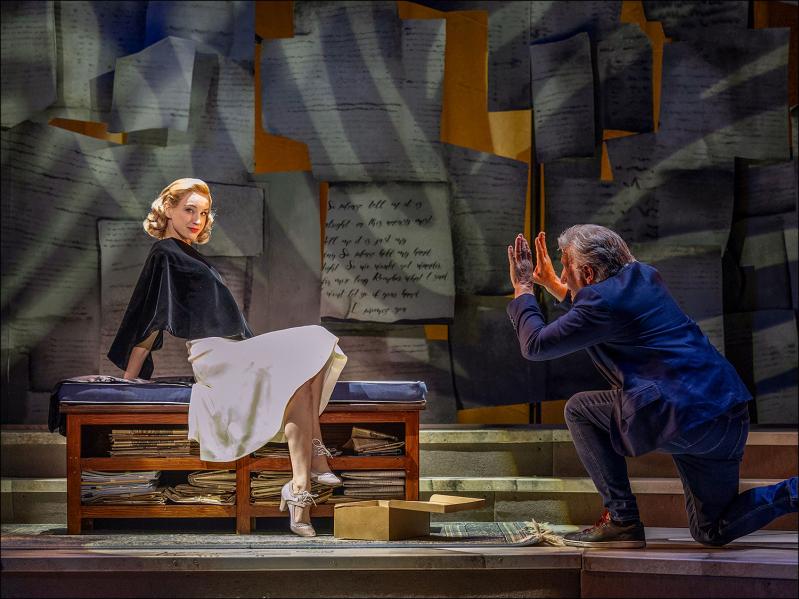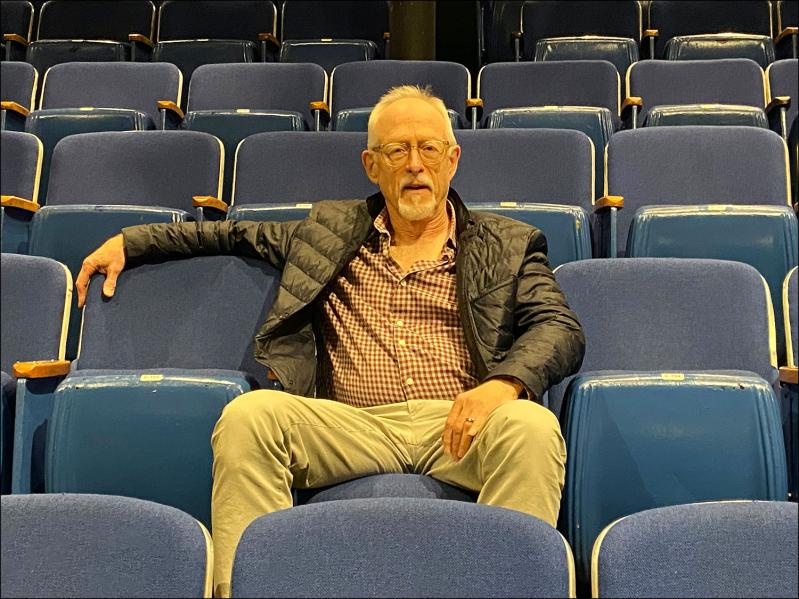Bay Street Theater’s 2025 summer season will kick off with a new play that came to the attention of Scott Schwartz, the theater’s artistic director, not from an agent or a producer but via a phone call from Robert Schenkkan, a Pulitzer Prize and Tony Award-winning playwright who lives a stone’s throw from the Sag Harbor theater.
“Scott and Tracy [Mitchell, the theater’s executive director] and I had been talking about doing something ever since I arrived here eight years ago,” Mr. Schenkkan said during a conversation at the theater. Some months ago, he called Mr. Schwartz to say he had a new play that was perfect for Bay Street. After reading it, Mr. Schwartz agreed.
“It’s very personal,” Mr. Schenkkan said. “It’s the love story of my parents, who fell in love during World War II and sustained that passion through their letters.”
“Bob & Jean: A Love Story” begins four days of previews on Tuesday at 7 p.m., with an all-but-sold-out opening night set for May 31 at 8. Directed by Matt August, it stars Mary Mattison as Jean, Jake Bentley Young as Bob, and Scott Wentworth as the narrator.

For 20 months during World War II, Bob was stationed in the South Pacific and Jean was touring the United States with a U.S.O. company performing “Arsenic and Old Lace.” During that time, Bob, who was 25, and Jean, 22, exchanged letters that wound up in a box in the couple’s attic.
“It wasn’t until many years later, when Bob and Jean had both passed, and I was a father myself, that I was missing them, wishing I could have conversations with them that I hadn’t,” Mr. Schenkkan said. “The tragedy of life is that by the time we’re old enough to really appreciate what they have to say, it’s often too late.”
The letters were mostly written by hand. “They were both recounting their adventures, seeing the world and meeting interesting people and doing really interesting things. Their whole world was in front of them — their dreams and their hopes and their ambitions.” To be clear, the play is not epistolary; Mr. Schenkkan used their content as well as other sources to shape the action.
The narrator, a stand-in for the author, is the adult son considerably older than the young couple he is observing, and is sometimes in conversation with them. “It’s totally different from anything else I’ve done,” Mr. Schenkkan said. “Not that I haven’t written intimate pieces, but it’s been a long time. This has plenty of dramatic stuff in it, but it’s intensely personal and very intimate.”

Raised in Austin, Tex., Mr. Schenkkan became interested in theater at the University of Texas and graduated with a bachelor’s degree in drama. “For a while I thought I was going to be Orson Welles,” he said. “I was going to act, write, and direct. The writing and acting happened, but the directing did not. It’s a very family-unfriendly career, and family is very important to me.”
After earning an M.F.A. in acting and theater at Cornell University, he moved to New York City, where he quickly settled into a solid acting career. He performed Off Broadway, was a stand-in on Broadway, and did a lot of regional theater, film, and television.
“For the longest time I was acting to support myself and my family and then writing in my spare time,” he said. Despite that, he managed to write his first full-length play, “Final Passages,” which premiered at the Studio Arena Theatre in Buffalo when he was still in his 20s. He signed with a literary agent and joined the New Dramatists and the Ensemble Studio Theatre, “so a lot happened from that play.”
A few years later, a second play, “Heaven on Earth,” opened Off Broadway at the same time as he was acting in the film “Pump Up the Volume” in Los Angeles. “It was a terrible way to manage the world premiere of a new play. I took my eye off the ball and the play suffered.” As a result, he took a hiatus from acting to focus on his next work.
He first imagined “The Kentucky Cycle” as two short plays, “but it kept getting bigger and bigger until it was nine short plays,” six hours in length, and required two evenings at each venue. It premiered in 1991 in Seattle, opened in Los Angeles in 1992, and went to Broadway in 1993. It won the 1992 Pulitzer Prize, the first play to do so before receiving a New York production.
Set in Eastern Kentucky from 1775 to 1975, it is the story of three families, Black, white, and Native American. Its genesis was a trip Mr. Schenkkan took to Eastern Kentucky with a pediatrician from that area while he was acting at the Actors Theatre in Louisville.
Traveling around the region with the doctor and a nurse team, “I had never physically experienced poverty like that, and it was keener because all the towns we were visiting had children, and the children were suffering. What was kind of unique about Kentucky was the juxtaposition of the ravages of strip mining set against these Eden-like mountains, and wealth living cheek by jowl with really abject poverty.”
An interesting sidelight is that, while he was living in Los Angeles and workshopping two other plays, the literary department of the Mark Taper Forum offered to commission “The Kentucky Cycle” and Tony Kushner’s “Angels in America.” He and Mr. Kushner frequently traveled to the same places, workshopping their plays. Eventually they showed them to the director of the Mark Taper, who was complimentary but did not pick up the option on either one.
Mr. Schenkkan tells young playwrights not to be discouraged when somebody doesn’t take their work. “It always just takes one person.” That person was Elizabeth Huddle at the Intiman Theatre in Seattle, who got “The Kentucky Cycle” on a Friday and accepted it the following morning.
Over the next 25 years, Mr. Schenkkan wrote and published 12 other full-length plays while becoming an in-demand screenwriter, working with the likes of Steven Spielberg, Tom Hanks, Oliver Stone, Robert Redford, and Denzel Washington.
He co-wrote the film “Hacksaw Ridge,” which earned six Oscar nominations, including one for the director, Mel Gibson, and a BAFTA nomination for the screenplay Mr. Schenkkan wrote with Andrew Knight. He also co-wrote “The Quiet American,” another multiple award-winner, which starred Michael Caine.
Politics and history have figured prominently in his playwriting, including “All the Way” and “The Great Society,” both of which were about Lyndon Baines Johnson’s pre-Vietnam career.
“I just thought he was such a Shakespearean figure, his physical size, his appetites. He had the obsession with power and politics, and then the tragic fall that was entirely his own fault, of course, but I thought there was something extraordinarily dramatic about this figure.”
“All the Way” won a Tony for best play and awards from the Drama Critics, Drama League, and Outer Critics Circle. He adapted it for an HBO film starring Bryan Cranston as L.B.J. that earned eight Emmy nods.
During the 2016 presidential campaign, Mr. Schenkkan again turned to politics with “Building the Wall.” He wrote that piece before the election. “I’d never written anything like that. Trump had already been talking about the border and what he was going to do and it was just raising a red flag.”
Told that the play seemed extraordinarily prescient, given where things are today, he said that one producer wanted to take an option on it for a revival, “But I just didn’t think that it speaks to where we are right now. That requires something different.”
Meanwhile, Mr. Schenkkan is working on a film and has a pilot in development. “Film and television are how I support myself,” he said. “Every playwright I know either teaches or writes for films. There’s no shame in that. I’m happy doing a variety of things. It’s not a burden.”
Performances will take place through June 15 on Sundays, Tuesdays, Wednesdays, and Thursdays at 7 p.m., Fridays and Saturdays at 8, with matinees on selected Wednesdays and Sundays. Tickets range from $49.99 to $164.99.




